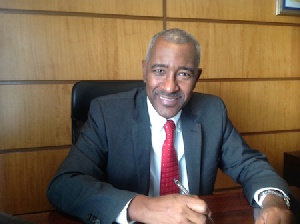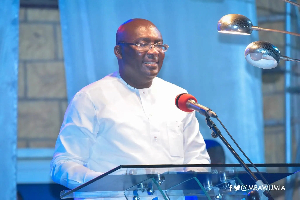The Director of African Operations of Republic Bank of Trinidad and Tobago, Mr Robert Le Hunte, has expressed confidence in the medium- and long-term prospects of Ghana’s economy.
According to him, this projection, coupled with the bank’s commitment to South-South co-operation, has played a role in encouraging Republic Bank to wait for the law to take its course in their bid to acquire majority shares in HFC Bank.
Mr Le Hunte further said that the Trinidad Bank is proud to be the first major investor in West Africa from the Caribbean.
Speaking to The Finder as the agreement with HFC Bank chalked its second-year anniversary last Thursday, he said: “We would like to quickly put the legal matter behind us and get onto the business of banking and building mutually beneficial relationships with Ghana, which is what we came to the country to do."
Mr Le Hunte explained that the partnership with HFC Bank was about adding value to the indigenous bank’s offerings and to enhance its ability to better serve the needs of the Ghanaian public.
He indicated that the capacity building plans of Republic Bank are intended to give staff of HFC Bank exposure to experiences that Republic Bank has had in Trinidad and the Caribbean, especially in key areas in the energy sector.
Currently, Republic Bank owns 40% of HFC Bank shares.
He noted that Republic Bank’s offer to the shareholders was in line with the Securities and Exchange Commission’s (SEC) Code on Takeovers and Mergers, which requires a shareholder in a listed company whose shareholding reaches over 30% to make an offer to the remaining shareholders.
This provision exists throughout the world on all stock exchanges and is geared towards protecting minority shareholders’ interests.
He explained that initially Republic Bank applied for a waiver from the SEC for an exemption from the requirement (arising from its acquisition of shares from Aureos) to make a mandatory takeover offer.
However, the application for the waiver was rejected. Republic Bank then sought and obtained permission from the Bank of Ghana to become majority shareholder in HFC, and when that was obtained, the mandatory offer had to be made.
As a result, upon receiving the Bank of Ghana approval, Republic Bank announced on April 17 that it would make an offer to all shareholders of HFC Bank to increase its investment in the bank.
When the offer is finally put before the shareholders, it will be up to them to either accept or reject the offer made. He emphasised that the decision will ultimately be made by the shareholders of the bank, who are its owners.
Mr Le Hunte stated that the ultimate objective in Republic Bank acquiring majority shares in HFC Bank was to partner with the bank and leverage Republic Bank’s expertise in oil and gas financing and mortgages to the benefit of all Ghanaians.
He stated that Republic Bank looks forward to the prospects of working with a cadre of Ghanaian bankers to assist them in their entry into the Sub-Saharan market, with HFC as the key partner.
According to Le Hunte, Republic Bank has tremendous experience in this line of business and they intend to leverage this experience to introduce major transformational change into mortgage financing in the country with products to suit various income levels in the country.
This means that all income levels, particularly the lower income bracket, which has been challenged in their access to mortgage financing over the years, will have available to them packages to enable them to access funds to acquire their own homes.
Mr Le Hunte noted that Trinidad and Tobago is one of the few countries in the world that have successfully built the capacity of local companies to participate meaningfully in their oil and gas sector and take advantage of local content policy.
He said Republic Bank, being the largest financial institution in Trinidad, was the major player in providing financing to local companies, which allowed them to grow and embrace the local content policy. Republic Bank plans to do the same in Ghana.
He said Republic Bank chose Ghana for its entry into the African market because of its political stability as well as the longstanding cultural and historic ties with Trinidad and Tobago.
It is a fact that many people in Trinidad and Tobago can trace their roots to West Africa, especially Ghana and Nigeria.
He emphasised that the bond between the two countries go way back and this bond was strengthened with the friendship between their founding prime ministers – Dr Eric Williams and Dr Kwame Nkrumah.
George Padmore, after whom a library is named in Ghana, was Kwame Nkrumah’s Advisor on African Affairs.
Republic Bank first purchased 8.79% shares in HFC Bank Ghana for an amount of US$8 million in December 2012, following recommendations from the commercial arm of the World Bank, the International Finance Corporation (IFC).
Republic Bank bought the stake when HFC floated 112,420,246 ordinary shares under a private placement to shore up its statutory capital requirements.
Republic Bank's stake further increased to 32.02% after buying 23.23% additional shares, which was previously held by Aureos Africa Fund LLC on Friday, June 7, at a price of GH¢0.56 per share.
It further acquired 7.98% additional shares in 2013 from Union Bank of Nigeria, which increased its shareholding to the current 40%, making them the largest single shareholder in HFC Bank Ghana. All acquisitions were done with the knowledge of the board of directors of the bank.
Republic Bank has made an offer to HFC shareholders of GH¢1.60 per share, up from the initial indicative offer of GH¢1.30.
The revised offer at the time represented a 65% premium over the mandatory price and 28% above the current price of HFC that is trading at GH¢1.25 on the Ghana Stock Exchange.
Click to view details



Business News of Wednesday, 12 November 2014
Source: The Finder

















